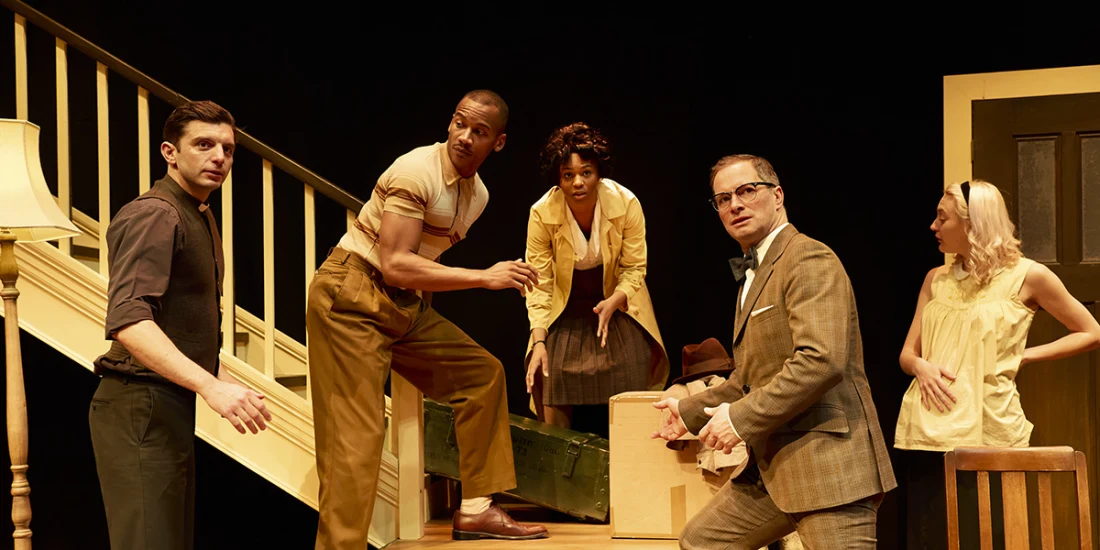'Clybourne Park' review — Bruce Norris's Pulitzer-winning play combines smarts and savagery
Not many plays have won a Tony, Olivier, and Pulitzer, but the enduring power of Bruce Norris’s 2012 Broadway entry Clybourne Park lands once more in its current revival at (aptly enough) north London’s Park Theatre, where the director Oliver Kaderbhai lands the singular savagery of the writing afresh.
Its opening delayed by the pandemic, as continues to be a commonplace these days, the play packs a singular wallop that may even be greater now than when this satire was first seen. Like it or not, we live in an age of ever-heightened sensitivities that Norris’s writing skewers with merciless, unswerving aplomb.
Norris takes as inspiration of sorts A Raisin in the Sun, though you don’t have to know a thing about Lorraine Hansberry’s Broadway trailblazer — premiered in 1959, the same year that the first half of Clybourne Park is set — to get ensnared in the cat’s cradle of vituperation, grievance, and grief that courses through a show that can also be scaldingly funny — unprintably so in its specifics.
If the cast sometimes overeggs characters several of whom are already written at extremes, the power of the play was felt afresh at a recent matinee at which audience members more than once responded audibly at times, as if waiting for a break, or for the end, were an impossibility given the electric charge of what they had just heard.
The first act finds us in the Chicago home of Russ (Richard Lintern) and Bev (Imogen Stubbs), who are still reeling from the tragic death of their only son, a soldier, and who are planning to sell up and move on so as to start anew. The kind-hearted if scatty Bev diverts a mother’s unquenchable sense of loss into musings about words (“Neapolitan”, for one) possessed of varying degrees of preposterousness when this same wife and onetime mum isn’t finding the best in a world that hasn’t given her much by way of solace in return. (She speaks of wanting humankind at “one big table”, a view not exactly shared by others in this play.)
Her husband, meanwhile, is moody and stern-faced and none too welcoming to visitors to his midst, chief among them the shockingly candid Karl (Andrew Langtree) — the one character actively carried over from Hansberry’s pioneering play about Black American life.
Karl ponders the penchant for skiing, or not, among the Black community and actively questions whether he is being “silenced”, this play’s direct equivalent to the cancel culture of today. Bev and Russ’s marriage, whatever its faultlines, seems a model of deportment set against that of Karl and his wife Betsy (Katie Matsell), who may be deaf but is attuned in every possible way to a spouse whom on some level she clearly detests.
While Bev and Russ’s Black maid and her husband tend to an upstairs trunk that will prove crucial to the plot, much is made of an (unseen) Black family — the aspirational Youngers of Hansberry’s play — who are taking over the property from Russ and Bev in a sign of the changing times that certainly isn’t to the taste of Karl and his sort.
Come the second act and we’re now in 2009, the passage of time marked by projections of the intervening presidents that give James Turner’s set the air of a power point presentation. The Youngers have since come and gone from this Clybourne Street address, leaving the house 48 hours away from demolition at the hands of new purchasers, who are white, and the community — if that word here even makes sense — gathered on a sweltering September day that brings with it a fresh set of characters, including one or two relations to people we have seen or at least heard of before.
The opportunities afforded the actors have always been amongst the joys of a play that lets its cast strike out in bold directions not once but twice, and a few of the performers here perform with such unbridled glee that they border on caricature.
Interestingly, the doubling of roles that was overplayed in this show’s London premiere at the Royal Court — that of Bev and then Kathy, a lawyer fully at home in the fractious fray — are this time out excellently served by Imogen Stubbs, a Park Theatre alum who makes something immediately touching out of a generosity to the ravaged Bev that marks just one of this play’s many affinities to Arthur Miller’s All My Sons. (Talk of a tree central to the property explicitly evokes Miller’s early masterwork as well.)
Michael Fox adroitly fields the dual assignments of a first-act cleric and then a gay architect with limited patience for the racial landmine into which he has entered, and the dancer Eric Underwood makes a terrific about-face to the realm of acting as a supportive husband in the first act who then goes snap in the second.
And though several of the others sometimes push proceedings into overdrive, that’s to be forgiven in a play that leaves scant room for politesse. You exit Clybourne Park dizzy from the volley of debate on topics of incendiary import then and now and wondering when you might ever repeat some of its post-interval jokes aloud: something not easily done in civilised society, to co-opt a potentially obsolete term. This may not be a play for the squeamish in our trigger-happy times, but it remains about as smart as they come.
Clybourne Park is at the Park Theatre to 23 April. Book Clybourne Park tickets on London Theatre.
Photo credit: Clybourne Park cast (Photo by Mark Douet)
Originally published on
